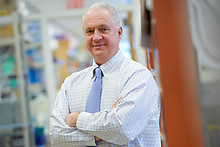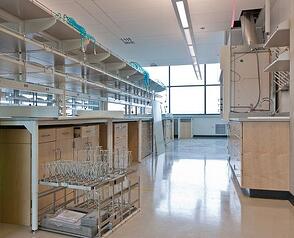Over 6 million cosmetic surgery procedures are done each year using Botox, a form of the botulinum toxin. However, besides reducing wrinkles, botulinum toxins are used to treat over 20 medical conditions. These include severe neck and shoulder muscle spasms, chronic migraines, excessive sweating, leaky or over active bladders, facial spasms, and Cerebral Palsy. Botulinum toxins are also quite deadly. In fact, one gram--the equivalent to ¼ teaspoon of sugar--could kill over a million people.
Read MoreTags: UW, Wisconsin, University of Wisconsin, University of Wisconsin Madison, UWisc, UW Madison, Biotechnology Vendor Fair, Madison, BioResearch Fair, Bioreseach, 2016, wisconsin science trade fair, University of Wisconsin School of Medicine, Botox, botulinum
Are you a lab supplier who is in need of information on life science research marketplaces, funding stats, and science product events in Washington?
Tags: 2014, 2013, Fred Hutchinson Cancer Research Center, Washington, UW, University of Washington, WA, WSU, Biotechnology Calendar, Washington State University, Washington Life Science, 2013 schedule of Events, BioResearch Product Faire Event, Life Science Marketing, Biotech current events, Seattle, Front Line, Hutch, Pullman
For all the excitement there’s been over stem cells in biotechnology (including in our Science Market Update posts- for example Mayo Clinic Spearheads Regenerative Medicine and California to Spend $32M on Stem Cell Research Biobank), one very exciting application for the technology that has been heretofore unannounced is stem cell transplants in the brain. Here to remedy this fact is the University of Wisconsin at Madison, where it was just recently discovered that stem cells can form nerve cells which can actually increase learning and memory capability.
Tags: 2014, Midwest, 2013, UW, WI, Wisconsin, University of Wisconsin, University of Wisconsin Madison, UWiscRP, UWisc, University of Wisconsin Research Park, BioResearch Product Faire Event, Front Line event, Madison, Front Line
 The Fred Hutchinson Cancer Research Center and the University of Washington Medicine in Seattle are pleased to announce the arrival soon of Dr. Eric Holland, a world-class brain cancer research scientist and neurosurgeon, who will head up the Human Biology Division at Hutch as well as the Alvord Brain Tumor Center at UW. The eminent MD/PhD is being lured away from Manhattan's Memorial Sloan-Kettering Cancer Center, where he directs the MSKCC brain tumor center and has his lab within the Cancer Biology and Genetics Program, where his team studies the molecular mechanisms underlying the development of central nervous system tumors. In addition to being the recipient of many prestigious awards over years, Holland brings with him over $3M a year in NIH/NCI funding. It's unclear how many of his 13 lab members will follow him across the country to take on new challenges at Hutch and UW.
The Fred Hutchinson Cancer Research Center and the University of Washington Medicine in Seattle are pleased to announce the arrival soon of Dr. Eric Holland, a world-class brain cancer research scientist and neurosurgeon, who will head up the Human Biology Division at Hutch as well as the Alvord Brain Tumor Center at UW. The eminent MD/PhD is being lured away from Manhattan's Memorial Sloan-Kettering Cancer Center, where he directs the MSKCC brain tumor center and has his lab within the Cancer Biology and Genetics Program, where his team studies the molecular mechanisms underlying the development of central nervous system tumors. In addition to being the recipient of many prestigious awards over years, Holland brings with him over $3M a year in NIH/NCI funding. It's unclear how many of his 13 lab members will follow him across the country to take on new challenges at Hutch and UW.
Tags: 2014, 2013, Northeast, Fred Hutchinson Cancer Research Center, Washington, UW, University of Washington, WA, Northwest, cancer research, Memorial Sloan-Kettering Cancer Center, brain research, Neuroscience, BioResearch Product Faire Event, Funding, Front Line event, Seattle, Frontline Event, Hutch, Cancer Center
The University of Wisconsin-Madison is a richly-funded science research environment, which is especially evident given recent NSF and NIH research funding statistics. In total, the University of Wisconsin-Madison received $335.9 million in research funding from the NSF and NIH in 2012. The NSF awarded the university $106 million. Of that money, $13.8 million went to bio research projects alone. For our readers’ convenience, we have spotlighted the top five NSF-funded bio research projects broken down by funding program, project title and research funding below.
Tags: 2014, Midwest, 2013, UW, WI, Wisconsin, University of Wisconsin, University of Wisconsin Madison, UWiscRP, UWisc, University of Wisconsin Research Park, UW Madison, bio research, BioResearch Product Faire Event, Research Funding, Front Line event, Madison, Front Line, NIH funding, NSF funding
When a catastrophic natural disaster strikes, first responders often make the difference between life and death for potential victims. Training, preparedness and valor play a part in successful rescue efforts, but so do good tools. Sometimes that tool is as basic as an axe or a flashlight, or a life vest or life raft. The recent mega-storm in the NE has us thinking about the kinds of tools that science research is coming up with to address emergency and crisis situations, both during and in the aftermath of a major event. To that end, we're taking a look back today at some of our earlier blogs on life science research invention to see what kinds of scientific solutions are on the horizon (or already here) to aid in disaster relief and recovery efforts.
Tags: UW, Ozcan Nano/Bio Photonics Lab, University of Washington, WSU, University of Minnesota Twin Cities, 2012, Los Angeles, Colorado State University Fort Collins, BioResearch Product Faire Event, UCLA, Front Line event, Seattle, Biotechnology Vendor Showcase, Colorado, St.Paul, scientist solutions, CSUFC, disaster relief
One of the things they got was some very thoughtfully designed labs. Though flexibility of design is important to assure future utility, research team leaders gave significant input into the design of their specific labs to make sure those labs were ideal for the type of research that would be carried out within their walls. Project architect Tim Williams, of Zimmer Gunsul Frasca, said in an interview:
“Scientists spend a lot of time in the lab. The UW faculty wanted to look at how we could make that a nicer place to be."
Here are some of the ways they made a nicer science lab building:
 5-story, 90,300sf structure
5-story, 90,300sf structure- Each of the four above-ground floors is divided into a laboratory half and an office half
- The basement is a 28,000sf low-vibration lab space
- Houses more than 15 faculty, 3 research centers and 4 major instrumentation centers
- Aluminum-plate shielding on the building guards against electromagnetic waves
- Natural ventilation in office spaces provided by windows that open
- Optimized ventilation in the lab spaces, replacing air 6 times per hour rather than 10
- Innovative commons spaces
- Green roof gardens
UW officials are proud of the new building, not just because it is state-of-the-art, but also because it's "state-of-the-science." Molecular engineering is a relatively new field, and the UW Molecular Engineering and Sciences Institute (MOLES, the building's primary occupant) sees its mission as exploring a new kind of engineering for the 21st Century: rather than build bridges over rivers (still a noble feat), the new molecular engineer may be building proteins that travel to specific parts of the body. He or she may follow the latest developments in chemistry, biology, physics, nanotechnology and predictive modeling; and his or her research projects will often be interdisciplinary, with colleagues from diverse fields and perhaps different institutions.
Furthermore, if life scientists often pursue basic research to understand the building blocks of life, and engineers build things and occupy themselves with practical mechanics and physical principles, the fusion of the two should have tremendous translational potential. Such is the goal of MOLES and their new collaborative workspace. Per their website:
Research at the Institute for Molecular Engineering & Sciences will be evolvable and dynamic, focusing initially on the themes of CleanTech and BioTech.
Some of the faculty scientists who will be doing research in the new MOLES facility include:
- Patrick Stayton, a professor of bioengineering
- Suzie Pun, a bioengineering associate professor
- David Baker, a biochemistry professor
- Daniel Gamelin, a chemistry professor
- Hugh Hillhouse, a chemical engineering professor
- Christine Luscombe, an associate professor of materials science and engineering
(Dr. David Baker seems to come up in our blog series with regularity. For former blogs citing his work, read the following:)
Computational Biology Scientist at UW Develops New Protein Structure
Crowdsourcing Research Challenge by UW Scientists a Game Changer?
Biotechnology Calendar, Inc. will hold 3 professional tradeshow events focusing on Washington state's bioscience technology and the research partnerships between scientists and the science equipment industry next month on these dates:
- 10/23/2012 -- Washington State University BioResearch Product Faire event, Pullman
- 10/24/2012 -- Fred Hutchinson Cancer Research Center BRPF event, Seattle
- 10/25/2012 -- University of Washington Front Line event, Seattle
For information on exhibiting at the University of Washington show in particular, and receiving a university research funding report, click here:
Biotechnology Calendar, Inc. is a full service event marketing and planning company producing on-campus, life science research tradeshows nationwide for the past 20 years. We plan and promote each event to bring the best products and services to the best research campuses across the country.
Tags: Bioscience research, CEEM, UW, Molecular Engineering, University of Washington, Northwest, WSU, New research facilities, 2012, Biochemistry, chemistry research, Engineering, Front Line event, Energy, Seattle, new construction, construction
The University of Washington, Seattle recently received a $65 million grant from the NIH to help improve and streamline the UW Institute of Translational Health Sciences (ITHS) research program. This is the second grant of this type awarded to UW and will fund the program over a five year period.
Tags: Washington, UW, University of Washington, WA, WA research, Translational Research, WSU, 2012, Funding, Front Line event, NIH, Seattle, new research grants
The Washington-based Pacific Northwest Prostate Cancer SPORE (Specialized Programs of Research Excellence) is a cutting-edge life science consortium which includes several research centers throughout Washington State and British Columbia. The consortium focuses on the genetic mechanisms of prostate cancer to better develop effective treatments for the disease.
Tags: Fred Hutchinson Cancer Research Center, UW, University of Washington, WA research, 2012, Washington Life Science, washington life science consortium, BioResearch Product Faire Event, Front Line event, NIH, Seattle, research grant
In 1962, the Seattle World's Fair was held in the northwestern capital city. The legacy of that event goes well beyond the iconic Seattle Space Needle (right) and is explored in a panoply of summer and fall educational and entertainment festivities celebrating the 50th Anniversary. One of the "Next50" happenings is an interactive exhibit to highlight the role of Washington State's life science research innovations in addressing global health challenges. If space exploration was the governing dream of the near future in the 1960's, our generation's overriding fascination may be with possibilties inherent in life science research discoveries and their applications for transforming the health of millions of people worldwide in order to lead fuller, longer lives.
Tags: UW, University of Washington, Northwest, Lab-on-a-chip Technology, 2012, science event, Event, Front Line event, science current event, Seattle, bioscience event, Science research hub, scientist solutions, Exhibit space



